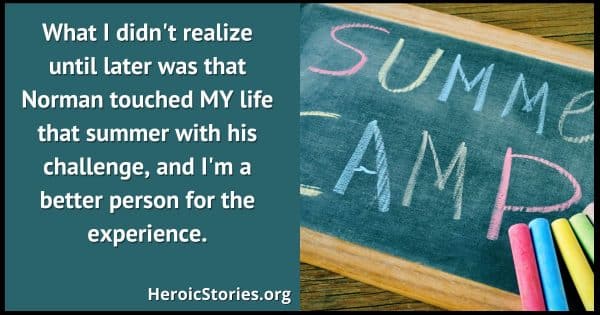by Joe Blachman
Panorama City, California, USA

In the summer of 1983, I worked at a camp near Lake Arrowhead in Southern California. This was the last summer of my college years and would likely be the last I could afford to spend working at a camp. At 22, I was among the more senior staffers in age. The camp director, Norman, was not only my boss that summer but had been director at a camp I attended as a child.
In 1982, when we met after many years, Norman was recruiting for positions of counselor, unit head, specialist, and maintenance crew. Norman’s goal was to put an all-Jewish staff in place for this Jewish summer camp. Never before had the camp’s entire maintenance crew been Jewish. I had the skills he needed and gladly accepted his offer.
I proudly served as a camp maintenance man in 1982 and 1983. As staff members, we were encouraged to participate in activities for the kids. In 1983, Norman went one step further. The night before the first session of the summer, Norman challenged each of us to “touch a life.” He said that if each of us could walk away from the summer having touched the life of just one child, we could consider the entire summer a success.
As a maintenance man, I faced a challenge. How could I touch a life by hauling trash, setting up a room, or plunging a toilet? The call to action was clear, but how could I make it happen within the confines of my job?
One day after lunch, one of the kids sat down next to me and asked, “Are you really Jewish?” I told Roger that I was indeed Jewish. He asked how I knew how to fix and build things. He asked how I learned painting, electrical, and plumbing. In his frame of reference, an affluent Jewish family in Southern California, he had never encountered Jewish manual laborers. I told him about shop classes in high school and about training and working at a different Jewish camp. I told him how I had worked on a kibbutz in Israel for five months as the facility manager’s assistant.
Norman must have hoped this type of interaction would take place. It was an important lesson to demonstrate to the kids: that everyone can learn to work with their hands and body, and that no task should be thought of as being beneath us, not even collecting the trash.
I knew from that moment that I had definitely touched a life, and that I did so every day the kids saw me working around them. I retain that concept to this day and use it when faced with ethical challenges. I ask myself, “What example would this choice set for children?” What I didn’t realize until later was that Norman touched my life that summer with his challenge, and I’m a better person for the experience.
Podcast: Play in new window | Download (Duration: 4:35 — 4.3MB)


This is a teaching story in a number of ways: (1) giving kids other perspectives of life, (2) teaching respect for all people and occupations, (3) “touching a life” as a goal for everyone, and (4) being an example for children (who have simple views of life) when faced with an ethical challenge. I applaud both Norman and Joe for being such awesome role models — well done!
Now 15 years later I would love to know how Joe’s life turned out – what he’s doing now. Any updates?
None that I’m aware of. I’m always hopeful that the subjects of the stories will find us and let us know…